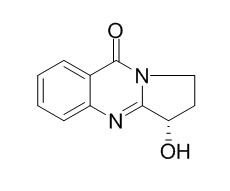Vasicinone
Vasicinone may act as a hepatoprotective agent. (±)-Vasicinone has significant antitussive, expectorant, and bronchodilating activities, which can be used to treat respiratory disease.(S)-Vasicinone exhibits antiproliferative activity against human gastric cancer cells MCG-803.
Inquire / Order:
manager@chemfaces.com
Technical Inquiries:
service@chemfaces.com
Tel:
+86-27-84237783
Fax:
+86-27-84254680
Address:
1 Building, No. 83, CheCheng Rd., Wuhan Economic and Technological Development Zone, Wuhan, Hubei 430056, PRC
Providing storage is as stated on the product vial and the vial is kept tightly sealed, the product can be stored for up to
24 months(2-8C).
Wherever possible, you should prepare and use solutions on the same day. However, if you need to make up stock solutions in advance, we recommend that you store the solution as aliquots in tightly sealed vials at -20C. Generally, these will be useable for up to two weeks. Before use, and prior to opening the vial we recommend that you allow your product to equilibrate to room temperature for at least 1 hour.
Need more advice on solubility, usage and handling? Please email to: service@chemfaces.com
The packaging of the product may have turned upside down during transportation, resulting in the natural compounds adhering to the neck or cap of the vial. take the vial out of its packaging and gently shake to let the compounds fall to the bottom of the vial. for liquid products, centrifuge at 200-500 RPM to gather the liquid at the bottom of the vial. try to avoid loss or contamination during handling.
J Traditional Thai Medical Res.2022, 8(1):pp1-14.
J Med Food.2022, 25(3):272-280.
J Microbiol Biotechnol.2024, 35:e2408022.
Sci Rep.2021, 11(1):14180.
Viruses.2021, 13(11):2118.
J Breast Cancer.2015, 18(2):112-118
Evid Based Complement Alternat Med.2021, 2021:5319584.
J of Archaeological Science:Reports2024, 53:104298
J Appl Biol Chem.2024, 67:33,238-244
Int J Biol Macromol.2025, 292:139225.
Related and Featured Products
Phytomedicine. 2015 Nov 15;22(12):1088-95.
Antitussive, expectorant, and bronchodilating effects of quinazoline alkaloids (±)-vasicine, deoxyvasicine, and (±)-vasicinone from aerial parts of Peganum harmala L.[Pubmed:
26547531 ]
METHODS AND RESULTS:
The aerial parts of Peganum harmala L. (APP) is a well-known and effective herbal medicine in China, and has been commonly used for treating various ailments, including cough and asthma. OBJECTIVES: To evaluate the antitussive, expectorant, and bronchodilating effects of the quinazoline alkaloids (±)-vasicine (VAS), deoxyvasicine (DVAS) (both isolated from the alkaloid fraction of APP) and (±)-Vasicinone (VAO) (synthesized from VAS).
CONCLUSIONS:
Quinazoline alkaloids VAS, VAO, and DVAS have significant antitussive, expectorant, and bronchodilating activities. VAS, VAO, and DVAS are the active ingredients in APP, which can be used to treat respiratory disease.
Indian J Exp Biol. 2014 Jul;52(7):705-11.
Evaluation of hepatoprotective activity of vasicinone in mice.[Pubmed:
25059038]
Justicia adhatoda (vasaka) leaves have long been used in Indian Ayurvedic system of medicine as antitussive. Its crude extract has been previously reported to have hepatoprotective activity.
METHODS AND RESULTS:
Vasicinone was isolated from leaves of J. adhatoda, column purified and characterized using, TLC UV, FT-IR and 1H NMR. The isolated Vasicinone was evaluated for hepatoprotective activity using (CCl4)-induced acute hepatotoxicity model in mice. CCl4 treatments lead to significant increase in SGOT, SGPT, ALP levels. Pre-treatment with Vasicinone and silymarin (25 mg/kg/day for 7 days) significantly decreased these enzyme levels. Histopathology of the livers from Vasicinone and silymarin pre-treated animals showed normal hepatic cords and absence of necrotic changes suggesting pronounced recovery from CCl4 induced liver damage. Both Vasicinone and silymarin significantly decrease the CCl4 mediated increase in pentobarbital indiced sleeping time in experimental animals, thus indicating recovery of liver function.
CONCLUSIONS:
Based on the above results it can be concluded that Vasicinone may act as hepatoprotective in mice and warrants further investigation on human volunteers.
J Asian Nat Prod Res. 2015 May;17(5):595-600.
Antitumor quinazoline alkaloids from the seeds of Peganum harmala.[Pubmed:
26166311 ]
METHODS AND RESULTS:
A phytochemical study on the methanol extracts from the seeds of Peganum harmala L. led to a new quizonaline alkaloid (S)-Vasicinone-1-O-β-d-glucopyranoside (1) and four known ones, (R)-Vasicinone-1-O-β-d-glucopyranoside (2), (S)-Vasicinone (3), vasicine (4), and deoxyVasicinone (5). Their structures were elucidated by spectroscopic analysis including IR, HR-ESI-MS, 1D and 2D NMR, and specific rotation as well as by comparison of the data with those in the literature.
CONCLUSIONS:
All of the alkaloids were screened for antiproliferative activity against human gastric cancer cells MCG-803 with MTT method. Compounds 1 and 3 exhibited moderate inhibitory activity.



